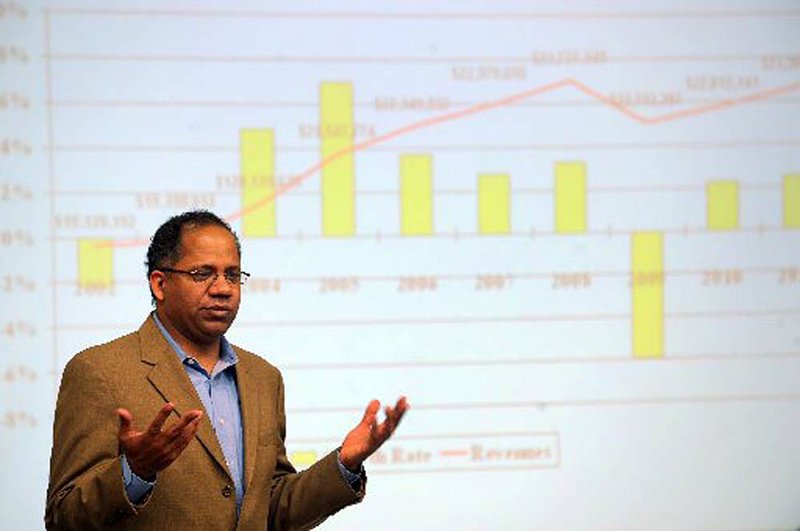LITTLE ROCK — Rick Daes thinks it’s time Little Rock bites the bullet and tells residents how much money the capital city really needs to function.
“I think it’s time for the city to invest in a sales tax,” the Meadowcliff/Brookwood Neighborhood Association president said Monday after listening to city officials talk for two hours about their 2011 spending plan that is status quo except for employee pay raises and an increase in Central Arkansas Transit Authority funding.
The capital city’s 2011 budget is built around keeping close to 200 jobs vacant - $5.5 million worth from the city’s general fund that includes the parks department and code enforcement, and $2.5 million worth of vacant jobs paid by specialty funds, like public works and the street department.
“I think it’s time to raise the sales tax and put people back to work,” Daes said at the first of four public hearings scheduled this week.
Little Rock’s sales tax hasn’t changed since 1994, when residents first approved the half-cent tax. The capital city now charges one of the lowest sales taxes in the state - a fact Mayor Mark Stodola hammered home repeatedly at the Monday night public hearing on the city’s $134.4 million spending plan.
While the city expects to spend that much, Little Rock anticipates only bringing in $128.9 million in revenue next year. Little Rock will cover the gap by transferring $3.4 million from other department funds and carrying over $2 million in franchise-fee, sale-tax and vacancy-savings revenue.
“It does provoke a dialogue,” Stodola told the two dozen residents at the Southwest Community Center off Base Line Road. “If you want something in one area, you have to take it away from somewhere else.”
Stodola stayed with that theme throughout the night, laying the groundwork for his plan to eventually ask residents to approve some kind of revenue increase for the city.
“We’ll either have to have more money to do more things or say to the public, ‘We’re going to have these 200 vacancies and that’s what you get,’” he said.
While Daes was supportive of raising the city sales tax, resident Luke Skrable said he thought Little Rock should stop the “giveaways and freebies” and focus on essential city services.
Little Rock plans to spend $9.18 million on outside agencies next year, including $6.6 million to Central Arkansas Transit Authority for bus and trolley service, and $1.46 million to the Pulaski County jail. The city also supports other organizations, such as the Arkansas Arts Center, Museum of Discovery, Metroplan, the Downtown Partnership and the Chamber of Commerce.
Skrable, a frequent speaker at city board meetings, was also critical of the city’s $2.5 million allocation for youth programs that focus on keeping teens out of gangs and other trouble during rough financial times.
“I don’t see how a football team can win a game with eight people. You have got to staff the city,” he said.
Stodola said he didn’t think the city should abandon its transit funding because some residents rely heavily on bus services. He also defended the city’s youth intervention funding, saying it’s one more crime prevention tool.
Other residents said the city needed to spend more money on infrastructure - one woman cited flooding problems in her southwest Little Rock neighborhood - or should come to the residents first to determine the city’s spending priorities rather than bringing them a balanced budget to comment on.
The proposed budget, which city directors are expected to vote on Dec. 7, also includes continued funding for cutting weed lots, demolishing unsafe structures and renting additional jail beds in Faulkner and Grant counties.
Members of the city’s fire, police and nonuniformed employees union will also receive a 4 percent raise after agreeing to forgo the contractually agreed to increase this year because of the city’s financial situation. Nonunion employees will be eligible for 4 percent merit raises. Department heads are working on evaluations now so employees can start the new year with their raises.
The raises represent most of the 3.1 percent increase over the city’s $130.4 million spending plan for 2010.
On the revenue side, the 2011 budget includes increases at city golf courses, including a $1 increase in electric cart fees, a 50-cent increase in beer prices and a 50-cent surcharge on credit-card transactions.The city also is using $50,000 from proceeds of the Little Rock Marathon and $50,000 from the Jim Dailey Fitness and Aquatic Center to fill in a gap in the $2.7 million golf budget.
The proposed budget is on the city’s website, www.littlerock.org. Tonight, city officials will make the same presentation at 5 p.m. at the Dunbar Community Center, 1001 W. 16th St., and again at 7 p.m. at the Northwest Police Substation, 10001 Kanis Road. They wrap up the public hearings with a 7 p.m. presentation Thursday at the Roosevelt Thompson Library, 38 Rahling Circle, in west Little Rock.
Arkansas, Pages 9 on 11/30/2010
